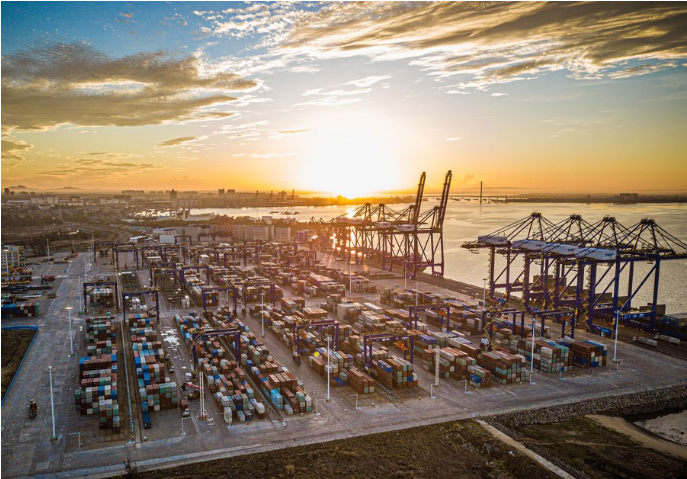BRI, other China-led visions high on 2023 agenda

Aerial photo taken on May 26, 2021 shows the Yangpu international container port at Yangpu economic development zone in South China’s Hainan province. 〔Photo/Xinhua〕
China-led visions, including the Belt and Road Initiative, will be a major highlight of Beijing’s diplomatic agenda next year to ensure they better serve the common good of the international community, officials and experts said.
State Councilor and Foreign Minister Wang Yi confirmed on Sunday that China will next year host the third Belt and Road Forum for International Cooperation, adding that”all parties are looking forward to the convening” of the event.
The first and second Belt and Road Forum for International Cooperation were held in 2017 and 2019 in Beijing, and brought together heads of state and government as well as leaders of top international organizations.
”We can jointly take stock of the achievements and draw up a blueprint to make this’belt of development’ that benefits the world (to become) more prosperous and broaden this road to happiness that benefits humanity,” Wang said in a recorded speech played to a top-level annual symposium on China’s diplomacy held in Beijing.
This year, China has made steady progress in advancing high-quality Belt and Road cooperation. In the first 11 months of this year, China’s trade with Belt and Road partners grew by 20.4 percent, despite the global economic downturn.
”China signed Belt and Road cooperation documents with another five countries this year, making the Belt and Road family a big gathering of 150 countries and 32 international organizations. This marks a new high in international economic cooperation, and serves as a new engine driving the development of all countries,” Wang said.
Wang also underlined the Global Development Initiative and Global Security Initiative when stating China’s plan next year to”look for the widest possible convergence of interests in global governance”.
Based on the implementation of the GDI and the GSI, China will”firmly uphold the UN-centered international system and the international order underpinned by international law, and build more consensus, pool greater strength and take more actions for the cause of global development and security”, he said.
Wang Yiwei, a professor at the School of International Studies and director of the Institute of International Affairs at Renmin University of China, said”China has become an important player in providing global public goods and in dealing with uncertain risks”.
The public goods provided by China now cover a wide spectrum, ranging from COVID-19 vaccines to visions such as the BRI, he noted.”The BRI is an international cooperation platform that provides a Chinese solution for the reform of the global governance system, and is of landmark significance in the history of world development,” the professor added.
In his speech, Wang Yi said the country will stay committed to its original aspirations; the Chinese path to modernization; peaceful development; high-standard opening-up; and dialogue between civilizations.
Beijing’s head-of-state diplomacy”will reach a new climax”, and further highlights are expected in diplomatic events hosted by China, he said.
As China will”expand all-around diplomacy in a coordinated manner”, Wang identified a few priorities for two-way interaction.
Strategic mutual trust and mutually beneficial cooperation between China and Russia will be deepened, and China-Russia comprehensive strategic partnership of coordination will be cemented, he said.
”China will follow through on the common understandings reached between the Chinese and US presidents, strive to recalibrate the China-US relationship, and bring it back on the right course,” Wang said.
China will also engage in closer high-level exchanges and strategic communication with Europe, and deepen friendship, mutual trust and convergence of interests with its neighbors, he added.
In addition, Beijing will strengthen solidarity and cooperation with other developing countries, and safeguard and expand the legitimate rights and interests of developing countries, he said.
 京公網安備 11010802027341號
京公網安備 11010802027341號